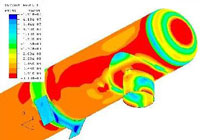Fitness for service evaluations determine whether equipment with existing flaws (such as distortions or cracks) found by inspection is suitable for continued service.

Codes and standards for pressurized equipment provide rules for the design, fabrication, inspection, and testing of new pressure vessels, piping systems, and storage tanks include:
- ASME B&PV Code, Section VIII, Division 1 - Rules for Construction of Pressure Vessels
- ASME B&PV Code, Section VIII Division 2 - Alternative Rules for Construction
- ASME B&PV 31.3 - ASME Code for Process Piping
- ASME B&PV 31.1 - ASME Code for Power Piping
- API 650 - Welded Steel Tanks for Oil Storage
- API 620 - Design & Construction of Welded Low Pressure Storage Tanks
- BS 5500 - British Standard for Unfired Fusion Welded Pressure Vessels
- EJMA - Standards of the Expansion Joint Manufacturers Association
However, some of these Codes do not address the fact that such equipment may degrade while in service, and that deficiencies due to degradation, or original fabrication defects may be found during subsequent inspections of in-service components. We provide Fitness-For-Service (FFS) evaluations to demonstrate the structural integrity of such equipment. Our evaluations, based on API-579 and other specifications, are used to make run/ repair/ replace decisions. These evaluations ensure that pressurized equipment containing flaws which have been identified by inspection can continue to operate. Our assessments include:
- General and local corrosion
- Bulges and out-of-roundness
- Tank settlement
- Mechanical vibration
- Creep & creep fatigue for equipment operating at elevated temperature
- Flaws/ Cracks - stress corrosion, fatigue & fracture
- Fatigue of welded joints
Fitness for Service evaluations often result in lower maintenance & operating costs as well as improved plant safety.





_300_300.jpg)
.jpg)
_300_300.jpg)
.jpg)
